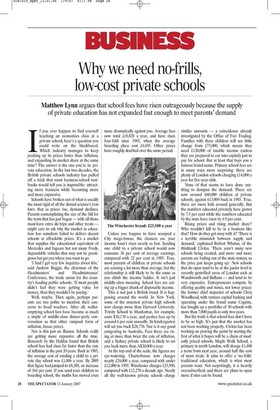Why we need no-frills, low-cost private schools
Matthew Lynn argues that school fees have risen outrageously because the supply of private education has not expanded fast enough to meet parents' demand 1 f you ever happen to find yourself teaching an economics class at a private school, here's a question you could write on the blackboard. Which industry manages to keep pushing up its prices faster than inflation, and expanding its market share at the same time? The answer is the one you're in: private education. In the last two decades, the British private schools industry has pulled off a trick that most business-school textbooks would tell you is impossible: attracting more business while becoming more and more expensive.
Schools have broken out of what is usually the most rigid of all the dismal science's iron laws: that as prices rise, demand declines. Parents contemplating the size of the bill for the term that has just begun — with all those must-have extra ski trips and other treats — might care to ask why the market in education has somehow failed to deliver decent schools at affordable prices. It's a market that supplies the educational equivalent of Mercedes and Jaguars but not many Fords, dependable vehicles that may not be prestigious but get you where you want to go.
'I find I get very few inquiries about this,' said Andrew Boggis, the chairman of the Headmasters' and Headmistresses' Conference, the trade union for the country's leading public schools. 'If most people didn't feel they were getting value for money, then they wouldn't be paying.'
Well, maybe. Then again, perhaps parents are too polite to mention their concerns to head teachers. After all, walletemptying school fees have become as much a staple of middle-class dinner-party conversation as that other rampant form of inflation, house prices.
Nor is this just an illusion. Schools really are getting more expensive all the time. Research by the Halifax found that British school fees had risen far faster than the rate of inflation in the past 20 years. Back in 1985, the average cost of sending a child to a private day school was £1,806 a year. By 2005 that figure had jumped to £8,388, an increase of 364 per cent. If you send your children to boarding school, the maths has moved even more dramatically against you. Average fees now total £18,828 a year, and have risen four-fold since 1985, when the average boarding place cost £4,045. Other prices have roughly doubled over the same period.
Unless you happen to have scooped a City mega-bonus, the chances are your income hasn't risen nearly as fast. Sending one child to a private school would now consume 36 per cent of average earnings, compared with 22 per cent in 1985. True, most parents of children at private schools are earning a lot more than average, but the relationship is still likely to be the same as you climb the income ladder. It isn't just middle-class moaning. School fees are eating up a bigger chunk of disposable income.
This is not just a British trend. It is happening around the world. In New York, some of the smartest private high schools now charge more than Harvard University. Trinity School in Manhattan, for example, costs $30,170 a year, and pushes fees up by around 6 per cent annually. Its kindergarten will set you back $28,770. Nor is it any good emigrating to Australia. Fees there are rising at more than twice the rate of inflation, and a Sydney private school is likely to set you back more than A$20,000 a year.
At the top end of the scale, the figures are eye-watering. Charterhouse now charges nearly £24,000 a year, compared with under £12,000 in 1995. Winchester charges £23,500, compared with £12,270 a decade ago. Nearly all the well-known private schools charge similar amounts — a coincidence already investigated by the Office of Fair Trading. Families with three children will see little change from £75,000, which means they need £120,000 of taxable income (unless they are prepared to eat into capital) just to pay for school. But at least that buys you a famous brand name. Primary school fees are in many ways more surprising: there are plenty of London schools charging £14,000 a year for five-year-olds.
None of that seems to have done anything to dampen the demand. There are now around 660,000 children at private schools, against 613,000 back in 1985. True, there are more kids around generally. But the numbers educated privately have grown by 7.5 per cent while the numbers educated by the state have risen by 4.9 per cent.
Rising prices and rising market share? Who wouldn't kill to be in a business like that? How do they get away with it? 'There is a terrible mismatch between supply and demand,' explained Robert Whelan, of the thinktank Civitas. 'There aren't many new schools being created, and more and more parents are bailing out of the state system, so the price just keeps going up.' New schools that do open tend to be at the junior level in recently gentrified areas of London such as Wandsworth and Balham — and tend to be very expensive. Entrepreneurs compete by offering quality and status, not lower prices: the former chief inspector of schools Chris Woodhead, with venture capital backing and operating under the brand name Cognita, has bought up a portfolio of 30 schools with more than 7,000 pupils in only two years.
But the truth is that school fees don't have to be so high. It's just that the market has not been working properly. Civitas has been working on proving the point by starting the first of what it hopes will be a chain of modestly priced schools. Maple Walk School, a primary in north London, will charge £1,480 a term from next year, around half the cost of most rivals. It aims to offer a 'no-frills' traditional education, which is what most parents want. Not surprisingly, it is heavily oversubscribed, and there are plans to open more if sites can be found.
By itself, one school won't make much difference. While the state sector largely fails to deliver an acceptable quality of education, the private sector largely fails to deliver it at a reasonable price. Here are three reasons why.
Most existing schools are charitable trusts. They don't have any incentive to expand, because they aren't businesses. Getting bigger just means more hassle all round. It is much easier to keep jacking the fees up so that your costs are comfortably covered — particularly when, as the OFT discovered, you can pretty much guarantee that none of your rivals will undercut you.
Next, the customers have not been pushing hard enough. If BMW tried to double their prices over the course of a decade, they would find a lot of unsold cars on their forecourts. At school, the customer is locked in. Once children are settled, parents are reluctant to move them. It's easier to send siblings to the same school. Prices escalate because schools can get away with it.
Worse, local authorities are not letting the market work. Whelan points out that the hardest part of setting up a new school is getting planning permission for the premises. 'Planners are prejudiced against new private schools, because of course it is competition for the rival local authority product,' he said. Unless you take over an existing school building — and not many are shutting down — that makes it virtually impossible for new schools to get into the market. If local authorities would allow entrepreneurs to buy failing shops or petrol stations in urban areas and turn them into schools, then the supply would start to expand.
Private education is, in effect, one of the country's most dysfunctional industries. There is no incentive to expand or keep costs under control. Parents are too nervous about standards to demand better value for money. The result? A sector where competition is weak, and innovation limited. If the transport industry was run that way, we would still be on horseback.
Yet although the laws of economics may have been suspended where schools are concerned, that doesn't mean they have been repealed. One day the market will surely reassert itself. Most countries are incapable of providing decent state education. Eventually a new breed of entrepreneurs will fill the gap. Where there is demand, there will eventually be supply. It's a simple lesson, even if you might not learn it at a £24,000-a-year school.























































 Previous page
Previous page